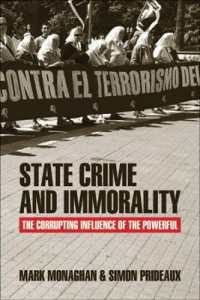Full Description
Grand Theater examines bureaucracy not as a readily identifiable structure but rather as a process of day-to-day operation. Thus it is concerned with how agencies of both the communist party and the state apparatus not only implemented directives from above but also responded to perceived successes and failures, chose to produce, share, and conceal information, and reacted when common citizens injected themselves into governance by making demands and complaints. It concentrates on the 1930s as a seminal period when Stalin's regime established a hypercentralized system that dominated the Soviet Union until its collapse and the Russian Federation since then. It also focuses on the administration of schools as the primary window through which to examine governance because of the importance of education to Soviet authorities, most notably Stalin himself, and the accessibility of archival documents in this field, one not classified as particularly sensitive.
Grand Theater provides novel insights into the functioning of Stalinist bureaucracy, brings to the forefront a new understanding of center-periphery relations, and reveals the important role of individuals in what has heretofore been largely regarded, when beyond the Kremlin's inner circle, as a highly impersonal system. It also examines in unprecedented ways the reciprocal relationship between ideology and policy formation, on the one hand, and actual administrative practices, on the other, a relationship that more often than not had negative and dysfunctional consequences for both the governed and governing. Holmes argues that the Soviet administrative system during the 1930s was much like grand theater. The documents produced for and by that system were the script for a discursive theatrical reality that inspired neither a careful appraisal of problems nor a dispassionate search for workable solutions.
Contents
Chapter 1 Preface
Chapter 2 Note on Transliteration and Abbreviation
Chapter 3 Districts in the Kirov Region, 1935
Chapter 4 Introduction
Chapter 5 1. A Script of Perfection, Failure, Blame
Chapter 6 2. Ascent into Darkness: Escalating Negativity, 1931-1941
Chapter 7 3. A Symbiosis of Errors: The Personal, Professional, and Political, 1931-1941
Chapter 8 4. The Art of Complaint, 1931-1938
Chapter 9 5. Power to the People and to the State: Great Performances by V. P. Bulygina and E. T. Chernykh
Chapter 10 6. "My Friend, I've Hit Rock Bottom": Politics and Friendship
Chapter 11 7. A Tragedy: The Terror
Chapter 12 8. Degeneration of the Symbiosis of Errors, 1938-1941
Chapter 13 9. "Stop This Petty Tyranny": The Administration of Schools in Falenki, 1940-1941
Chapter 14 10. Proprietary Professionalism: Mine by Right, 1938-1941
Chapter 15 Conclusion







